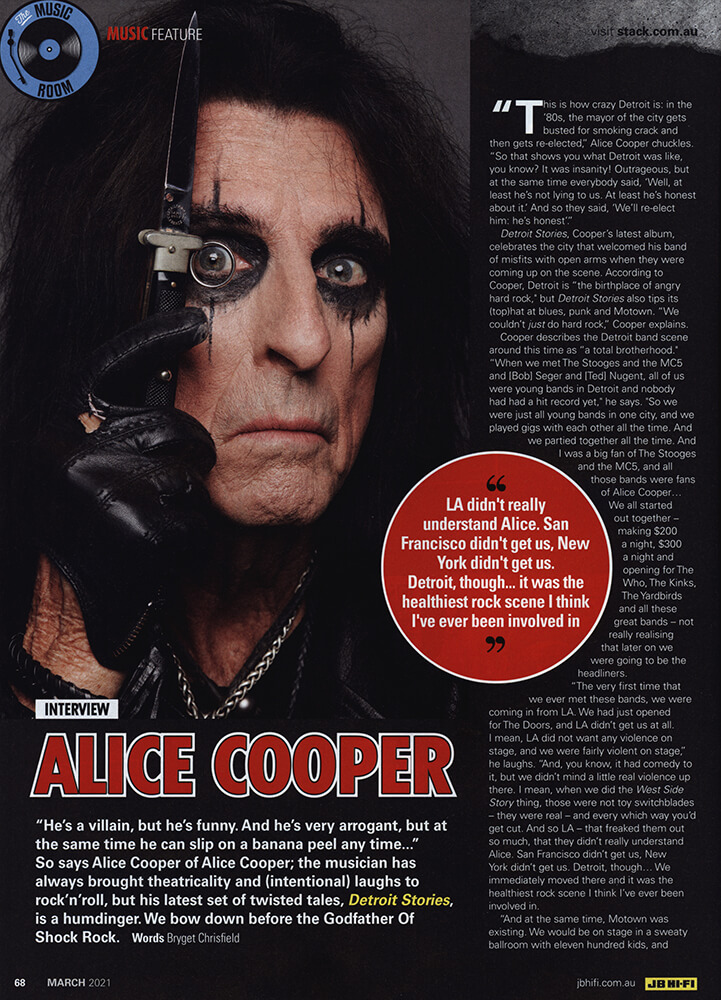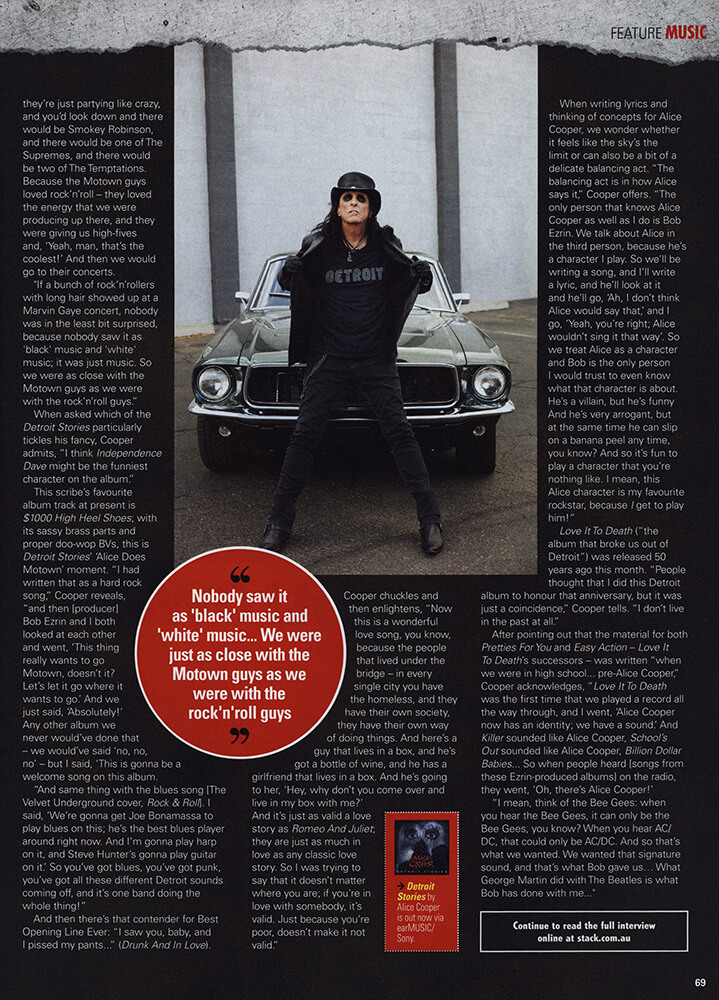Article Database

Stack
March 2021
Alice Cooper
Author: Bryget Chrisfield
"He's a villain, but he's funny. And he’s very arrogant, but at the same time he can slip on a banana peel any time..." So says Alice Cooper of Alice Cooper; the musician has always brought theatricality and (intentional) laughs to rock'n'roll, but his latest set of twisted tales, Detroit Stories, is a humdinger. We bow down before the Godfather Of Shock Rock.
"This is how crazy Detroit is: in the '80s, the mayor of the city gets busted for smoking crack and then gets re-elected," Alice Cooper chuckles. "So that shows you what Detroit was like, you know? It was insanity! Outrageous, but at the same time everybody said, 'Well, at least he's not lying to us. At least he's honest about it.' And so they said, 'We'll re-elect him: he's honest'."
Detroit Stories, Cooper's latest album celebrates the city that welcomed his band of misfits with open arms when they were coming up on the scene. According to Cooper, Detroit is "the birthplace of angry hard rock," but Detroit Stories also tips its (top)hat at blues, punk and Motown. "We just couldn't just do hard rock," Cooper explains.
Cooper describes the Detroit band scene around this time as "a total brotherhood."
"When we met The Stooges and the MC5 and [Bob] Seger and [Ted] Nugent, all of us young bands in Detroit and nobody had had a hit record yet," he says. "So we were just all young bands in one city, and we played gigs with each other all the time. And we partied with each other all the time. And I was a big fan of The Stooges and the MC5, and all those bands were fans of Alice Cooper... We all started out together — making $200 a night, $300 a night and opening for The Who, The Kinks, The Yardbirds and all these great bands — not really realising that later on we were going to be the headliners.
"The very first time that we ever met these bands, we were coming in from LA. We had just opened for The Doors, and LA didn't get us at all. I mean, LA did not want any violence on stage, and we were fairly violent on stage," he laughs. "And, you know, it had comedy to it, but we didn't mind a little real violence up there. I mean, when we did the West Side Story thing, those were not toy switchblades — they were real — and every which way you'd get cut. And so LA — that freaked them out so much, that they didn't really understand Alice. San Francisco didn't get us, New York didn't get us. Detroit, though... We immediately moved there and it was the healthiest rock scene I think I've ever been involved in.
"And at the same time, Motown was existing. We would be on stage in a sweaty ballroom with eleven hundred kids, and they're just partying like crazy, and you'd look down and there would be Smokey Robinson, and there would be one of The Supremes, and there would be two of The Temptations. Because the Motown guys loved rock'n'roll — they loved the energy that we were producing up there, and they were giving us high-fives and, 'Yeah, man, that's the coolest!' And then we would go to their concerts.
"If a bunch of rock'n'rollers with long hair showed up at a Marvin Gaye concert, nobody was in the least bit surprised, because nobody saw it as 'black' music and 'white' music; it was just music. So we were as close with the Motown guys as we were with the rock'n'roll guys."
When asked which of the Detroit Stories particularly tickles his fancy, Cooper admits, "I think Independence Dave might be the funniest character on the album."
This scribes favourite album track at present is $1000 High Heel Shoes; with its sassy brass parts and proper doo-wop BVs, this is Detroit Stories' 'Alice Does Motown' moment. "I had written that as a hard rock song," Cooper reveals, "and then [producer] Bob Ezrin and I both looked at each other and went, 'This thing really wants to go Motown, doesn't it? Let's let it go where it wants to go.' And we just said, 'Absolutely!' Any other album we never would've done that — we would've said 'no, no,no' — but I said, 'This is gonna be a welcome song on this album.
"And same thing with the blues song [The Velvet Underground cover, Rock & Roll]. I said, 'We're gonna get Joe Bonamassa to play blues on this; he's the best blues player around right now. And I'm gonna play harp on it, and Steve Hunter's gonna play guitar on it.' So you've got blues, you've got punk, you've got all these different Detroit sounds coming off, and it's one band doing the whole thing!"
And then there's that contender for Best Opening Line Ever: "I saw you, baby, and I pissed my pants..." (Drunk And In Love). Cooper chuckles and then enlightens, "Now this is a wonderful love song, you know, because people that lived under the bridge — in every single city you have the homeless, and they have their own society, they have their own way of doing things. And here's a guy that lives in a box, and he has a girlfriend that lives in a box. And he's going to her, 'Hey, why don't you come over and live in my box with me?' And it's just as valid a love story as Romeo And Juliet; they are just as much in love as any classic love story. So I was trying to say it doesn't matter where you are; if you're in love with somebody, it's valid. Just because you're poor, doesn't make it not valid."
When writing lyrics and thinking of concepts for Alice Cooper, we wonder whether it feels like the sky's the limit or can also be a bit of a delicate balancing act. "The balancing act is in how Alice says it," Cooper offers. "The only person that knows Alice Cooper as well as I do is Bob Ezrin. We talk about Alice in the third person, because he's a character I play. So we'll be writing a song, and I'll write a lyric, and he'll look at it and he'll go, 'Ah, I don't think Alice would say that,' and I go, 'Yeah, you're right; Alice wouldn't sing it that way'. So we treat Alice as a character and Bob is the only person I would trust to even know what that character is about. He's a villain, but he's funny. And he's very arrogant, but at the same time he can slip on a banana peel any time, you know? And so it's fun to play a character that you're nothing like. I mean, this Alice character is my favourite rockstar, because I get to play him!"
After pointing out that the material for both Pretties For You and Easy Action — Love It To Death's successors — was written "when we were in high school... pre-Alice Cooper," Cooper acknowledges, "Love It To Death was the first time that we played a record all the way through, and I went, 'Alice Cooper now has an identity; we have a sound.' And Killer sounded like Alice Cooper, School's Out sounded like Alice Cooper, Billion Dollar Babies... So when people heard [songs from these Ezrin-produced albums] on the radio, they went, 'Oh, there's Alice Cooper!'
"I mean, think of the Bee Gees: when you hear the Bee Gees, it can only be the Bee Gees, you know? When you hear AC/DC, that could only be AC/DC. And so that's what we wanted. We wanted that signature sound, and that's what Bob gave us... What George Martin did with The Beatles is what Bob has done with me..."




